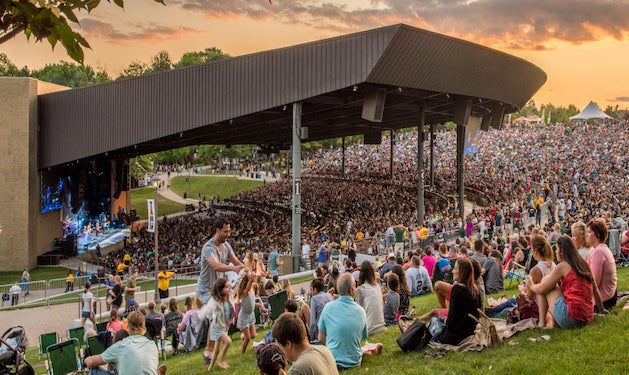Arlo Guthrie
Just after midnight on the first day of the festival, the audience was settling in, the rain had stopped, and Arlo Guthrie took the stage for his 45-minute set of music, sing-along, and rambling commentary about the amazing event that was unfolding at his feet.
Day One, Performer 7: Arlo Guthrie
Performed Saturday morning, August 16, midnight–12:45 am
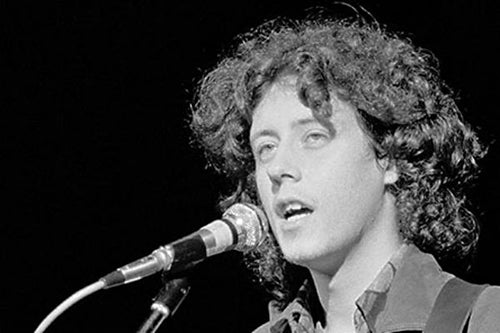
Arlo Guthrie Band Members
- Arlo Guthrie: vocals, guitar
- John Pilla: guitar
- Bob Arkin: bass
- Paul Motian: drums
Arlo Guthrie Woodstock Setlist
- Coming into Los Angeles
- Wheel of Fortune
- Walking Down the Line
- Arlo Speech: Exodus
- Oh Mary, Don't You Weep
- Every Hand in the Land
- Amazing Grace
Arlo Guthrie grew up in Brooklyn, the oldest son of legendary folk musician Woody Guthrie and dancer Marjorie Mazia Guthrie. From an early age, he was surrounded by creative people— Pete Seeger, Ronnie Gilbert, Fred Hellerman, and Lee Hays; Lead Belly, Cisco Houston, Sonny Terry, Brownie McGhee, and others who came to the Guthrie home to visit with Woody and play music together. One houseguest in particular, Ramblin’ Jack Elliott, encouraged the young Arlo to pick up the guitar, and soon Guthrie was picking up stylistic cues from Mississippi John Hurt and Doc Watson. From his father, Guthrie developed a storytelling style and personal songwriting that embraced protest and took a stand for social justice. When asked in a 2009 interview if he ever thought of his famous father, he answered, “Every day. I think of my parents as a single unit, and it’s interesting because they shared so much and they were totally opposite. My mother, a Martha Graham dancer, had a classical background; my father had a back-porch background.”
The Guthrie family moved to Stockbridge, Massachusetts when Arlo was in his teens, and upon graduation from high school, he traveled to London for the summer, where he was introduced to that city’s burgeoning folk rock scene. Later that year, on Thanksgiving break from college, the 18-year-old Arlo Guthrie was arrested for illegally dumping some garbage from the home of his friends Ray and Alice Brock. It was Thanksgiving Day 1965, the public dump was closed for the holiday, and he discarded the trash on private property where others had been dumping trash. The experience of being arrested for “littering” inspired a talking blues song that Arlo named “Alice’s Restaurant Massacree,” a rambling song that some consider “anti-war,” but which Arlo claims is actually “anti-stupid.” He performed the song in coffee houses and other small venues, when radio host Bob Fass played a recording of a 1967 live performance of the song on his radio show. That landed Arlo a recording contract, and his first album, Alice’s Restaurant, was released that year. In 1969, filmmaker Arthur Penn (Bonnie and Clyde, Little Big Man, The Miracle Worker) turned the song into a movie, a cult classic that features many of the actual people described in the song. Although Arlo rarely performs the song anymore, the song has gone on to become a Thanksgiving tradition on radio stations across the country and is his trademark song.
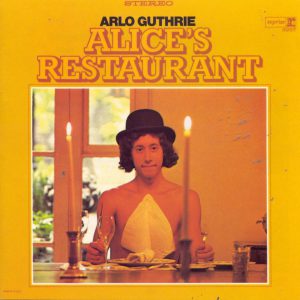
Arlo Guthrie developed a large following through his live performances and constant touring. His second studio release, Running Down the Road, was released in 1969 and features a roster of musicians that included Ry Cooder, Gene Parsons, Chris Ethridge, and Jim Gordon, in addition to Guthrie’s usual band. The album received favorable reviews when it was released, and his version of “Stealin’,” a folk song from the 1920s, was included on the album and later used in the 1971 film Two-Lane Blacktop.
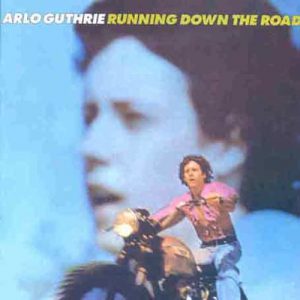
By the time Arlo Guthrie was booked to play Woodstock, his star was rising and everyone knew him and his music. For the festival, he assembled a band of accomplished musicians: his friend and long-time collaborator John Pilla on guitar, and jazz musicians Bob Arkin and Paul Motian on bass and drums, respectively. They opened their set with “Coming into Los Angeles” from his then-current album Running Down the Road. While the band’s performance is energetic and spot-on, Guthrie’s vocals drag a bit, and his voice cracks on many of the high notes, likely because of his less-than-lucid state during the performance. Guthrie’s Woodstock performance of “Coming Into Los Angeles,” complete with the flat, barely-in-time vocal, is seen and heard in the Woodstock movie, but the soundtrack album used a more polished version recorded at The Troubadour in Los Angeles.
Before launching into the next song, Arlo addressed the crowd, proclaiming that he had been “rappin’ with the fuzz (can you dig it?)” and had heard there were “supposed to be a million-and-a-half people here by midnight,” and that the New York State Thruway was closed. Neither statement was true—the total attendance was more like 450,000, and only selected off-ramps on the Thruway were actually closed.
His voice improving, Guthrie followed with another song from the current album, “Wheel of Fortune,” and a Bob Dylan song, “Walking Down the Line,” during which he attempted to get the audience to sing along. With a little prodding, the audience complied.
What followed next was an almost ten-minute monologue that may have seemed like a total non sequitur—a comedic tale of Moses and the Israelites in the land of the Pharaoh, complete with “can you dig it,” “man,” and pot brownies. This story, obviously influenced by Guthrie’s love of the early 1960s comedy albums of Bill Cosby, loosely served as an introduction for the traditional spiritual “Oh Mary, Don’t You Weep.” Guthrie then sang another song from his then-current album, “Every Hand in the Land.”
Guthrie and his band wrapped up their set with a soulful, mournful rendition of “Amazing Grace.” While he was still struggling to hit the high notes, the audience responded enthusiastically to the heartfelt performance. Although Guthrie later expressed regrets about his condition on the stage at Woodstock, his presence was felt enough to be prominently featured in the documentary film, and Woodstock helped propel his career beyond “Alice’s Restaurant.”
Arlo Guthrie has continued to make his mark on the American music scene, and his recordings of “Alice’s Restaurant Massacree,” “The Motorcycle Song,” and Steve Goodman’s “City of New Orleans” are part of the American songbook. His 1976 album Amigo received a 5-star rating from Rolling Stone and may be his best-received work. The album features Leah and Russ Kunkel, Linda Ronstadt, and Waddy Wachtel. He stopped performing “Alice’s Restaurant Massacree” in the 1970s when he realized that all his fans had already heard it and were getting tired of it, but he made a promise to his fans that he would bring it back each decade, celebrating the 30th, 40th, and 50th anniversaries of the song with year-long tours.
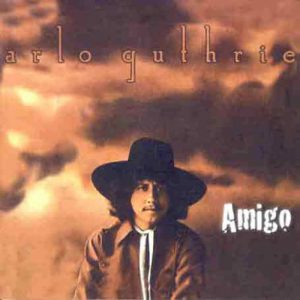
Arlo has also expanded upon his father’s legacy, touring extensively with his father’s close friend Pete Seeger from the late 1960s onward, performing at least a dozen shows a year with the folk music icon for the next 40 years. In 1991, Guthrie purchased the Old Trinity Church, the location in Massachusetts where the events that inspired “Alice’s Restaurant,” took place, and set up the nonprofit Guthrie Center to provide a range of local and international services, including weekly free lunches and support for families living with HIV/AIDS and other life-threatening illnesses.
Like his father, he has been a lifelong political activist, but his political leanings have evolved. He performed at George McGovern campaign events in 1968 and was a longtime left-leaning Democrat. In 2008 (the Obama/McCain election), he publically identified as Republican and now identifies as a Libertarian. In a 2015 Daily Beast interview Guthrie explained, “You have to understand that what changed in the ’60s was not the result of most people doing anything. It wasn’t even a whole lot of people. It was a critical mass. We as messengers of ideas have to remember: You don’t need to convince everybody. You don’t need to convince a lot of people, just enough people. When you have enough people to move the world forward, it will move.”
Arlo Guthrie released about an album a year through 1981 and still performs and records occasionally—children’s albums, live albums and compilations, tributes to his father, and other releases. He is often accompanied by his children, Abe, Annie, Sarah Lee, and Cathy, all of whom are musicians. He has performed at Bethel Woods Center for the Arts several times and has supported the museum’s mission since its early planning.
Guthrie’s longtime friend, producer, and guitarist John Pilla worked alongside him until Pilla’s death from a heart attack in 1988, producing every Guthrie album from 1970’s Washington County to 1986’s Someday. Guthrie admitted that he felt a bit lost in the studio after his friend died.
The other musicians who played alongside Arlo Guthrie at Woodstock did not come from the folk tradition as had Arlo and John. Drummer Paul Motian was an established jazz musician, having played drums with the Bill Evans Trio from 1959 to 1964 and Keith Jarrett from 1967 to 1976. He played for a time with jazz great Thelonius Monk and was a hard-working composer and band leader in his own right from the 1970s until his death in 2011. Bassist Bob Arkin has never achieved the fame of his actor brother Alan Arkin, but “has spent his life eking out a living with his bass, playing modest gigs mostly in New York,” according to a 2014 interview in The New York Times. Arkin played the bass with Catskills hotel show bands for 15 years, then played the streets and subways of New York City. He continues to play small New York clubs, stating that “these may not be the greatest gigs, but it took me 40 years to get them, so I might as well hang onto them for now.”
—Wade Lawrence & Scott Parker
